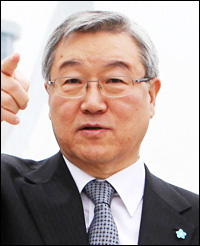
Foreign minister in knotty mission in Myanmar

South Korea’s top diplomat will hold talks with the foreign minister of Myanmar this week as the resource-rich Southeast Asian country draws a flurry of high-profile visits from European countries and the United States.
Minister of Foreign Affairs and Trade Kim Sung-hwan will sit down with his counterpart Wunna Maung Lwin Wednesday to discuss ways to bolster bilateral ties after Myanmar took a series of reforms and released hundreds of political prisoners.
Resumption of financial assistance to Myanmar, trade and North Korea will be on the top of the agenda, according to a foreign ministry official.
Kim will also pay a courtesy visit to Myanmar President Thein Sein, former Prime Minister who took power a year ago.
He will return to Seoul on Thursday.
However, the Foreign Minister’s trip to Myanmar is raising controversy as the long-isolated nation is still suspected of arranging an arms deal with North Korea that is to conduct a nuclear test any moment.
“I met with some officials and experts from Myanmar. They denied a transfer of nuclear technology from North Korea but admitted to partially importing conventional arms technology from North Korea. The rest of the military technologies that Myanmar has comes from China,” said a Myanmar expert in Korea in condition of anonymity. “I guess the foreign minister should talk about the issue with his Myanmar counterpart besides providing financial support.”
According to a foreign ministry official, the South Korean government has resumed concessional government loans to Myanmar last August which were suspended in 2005 due to international concerns on the human rights issue in the nation.
The official also added that the government plans to expand offering of the low-interest government loans to Myanmar which comes from the state-run Economic Development Cooperation Fund.
Against the backdrop, some experts urge for caution in re-engaging Myanmar since it is still largely led by rulers from the military government that came to power through a military coup in 1962.
“There is still uncertainty in Myanmar,” said the Myanmar expert. “It is sure that Aung San Suu Kyi endorsed Thein Sein’s reform measures. But it happened because the 67-year-old Suu Kyi is trying to make progress while she is alive.”
Myanmar’s general elections held in 2010 were widely disputed by pro-democracy opposition parties including Suu Kyi’s National League for Democracy asserting that the military regime had engaged in rampant fraud to achieve the result of winning majority seats at the legislature. The army and its allies gained about 85 percent of the seats in the parliament through the elections, together with non-election seats reserved for military appointees. Last February, Sein, a former military general and leader of the ruling Union Solidarity and Development Party, was elected president of Myanmar by the legislature.
Despite the measures led by the reformist President, questions remain over the further release of political prisoners, a ceasefire between the government and ethnic groups, and human rights abuses in Myanmar stemming from a decades-long struggle against the military-dominated government.
The European Union earlier announced suspension of most of the sanctions imposed on Myanmar except an arms embargo while Tokyo decided to waive about 300 billion yen ($3.7 billion) of Myanmar’s debt and resume assistance to the country, contingent on progress in the democratization in the country. <Korea Times/Chung Min-uck>


